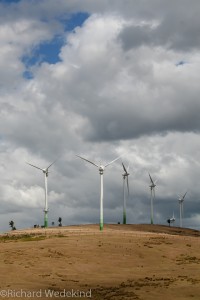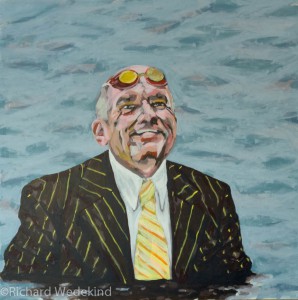Category Archives: Politics
Stagnant weather doesn’t hold back the climate
With Viscount Monckton of Brenchley currently touring New Zealand, I expect many of his adherents – including Federated Farmers, will hear quite a bit about the end of climate change because world temperatures haven’t increased for a decade. This meme is taking hold in all the places that want to latch hold of a headline rather than read the whole article (see post about Rodney Hide below). The Economist has recently posted a short discussion with their ‘Globalisation Editor’ in which he calls for a roll-back of climate measures in light of the mounting evidence.
Why then has the last decade – the warmest on record, not continued to get warmer as record amounts of CO2 are pumped into the atmosphere?
- The historic temperature record doesn’t show a steady year-by-year increase; there is typically a step-wise progression with plateaus followed by sharp jumps i.e a staircase rather than and single slope. A plateau in the temperature record is not in itself surprising.

The staircase to hades.
- The El Nino – La Nina cycle has an impact on global temperatures with El Nino dominated years relatively warm and La Nina years relatively cool. If the recent temperature record is divided into El Nino, La Nina and intermediate years and plotted, each category shows a near identical rise in temperature that has not paused nor shown evidence of decline.

- It is also apparent that man-made forces might be counteracting the expected temperature increases. Recently analysis has implicated pollution through both the input of aerosols into the atmosphere (think Beijing) that reflect incoming energy from the sun and fertilisation of the biosphere via CO2 and nitrogen that promote plant growth and the uptake of CO2. The question is are we prepared endure current levels of pollution to defer temperature rise?
Finally new research has revealed that although the surface temperature record has been static, in fact overall global warming has accelerated with more heat now being taken up by the oceans.
Overall this is a good example of how science works. We make an observation that temperatures have been static for a while and either go yippee the panic is over, or we say that’s funny, everything we know about physics says it should still be warming, what could be the reason? A variety of mechanisms have been proposed that may individually or collectively explain the phenomenon – none offer a reason to relax.
Don Elder was painted into a corner
Everyone from John Campbell to Gareth Hughes has been dumping on Don Elder over the last week. Not only did he oversee the now disastrous diversification of Solid Energy that has been deemed responsible for significant redundancies in the coal mining industry, but he also continues to draw his rather large salary while on gardening leave. John Key has been less than complimentary about the performance of the SOE which Bill English has assured will not be allowed to fail.
Regardless of who was running the show, Solid Energy was certainly facing the prospect of a grim future. Here we had a multi-billion dollar enterprise based on operating coal mines (Waikato, West Coast and Southland) and billions of tons of undeveloped lignite in Southland. As the reality of climate change begins to hit home, it is starting to dawn on even the energy companies, that their share market valuations are based on coal, oil and gas reserves that can never be developed. Current modelling suggests that the listed global Reserves of fossil fuels exceed what can safely be mined by a factor of 5.
We have not yet got to the stage where questions are being asked as to which reserves should not be mined and therefore which companies are grossly overvalued, but we are starting to see some manoeuvring as gas muscles into the power market in the U.S.A. at the expense of coal. The abundance of gas is also a factor in driving down coal prices which is hurting the bottom line at Solid Energy.
This is not the time to have a portfolio chock full of lignite; the dirtiest fossil fuel and perhaps the one most likely to be scratched from the Environment’s dance card. This is where Don Elder comes in. It was almost as if Solid Energy’s diversification strategy was to build up an industry around lignite, as quickly as possible, so that it is too big and too advanced to suffer in any subsequent environmental rationalisation. Hence the dash to develop diesel, fertiliser and briquette industries even though they were heavily criticised by the Parliamentary Commissioner for the Environment in 2010.
It would appear that Don Elder was trying to save his (our) coal company by making Solid Energy too big to fail and thus insulate it from inevitable rationalisations in fossil fuel use. This dinosaur strategy of following short-term profits/lift in company value at the expense of long-term consequences is prevalent in today’s economic growth models. The cynicism of this strategy is exemplified by the lack mitigation measures associated with the lignite projects.
Fortunately this grand gamble was laid low by a strong dollar and low coal prices. Lignite is now off the agenda and the coal mines face downsizing or mothballing. The employment crisis facing the laid off coal miners was always inevitable and the Government’s role should be to facilitate their transition from the industry rather than prop it up through cost-cutting measures such as allowing mining in the Conservation Estate.
Government has us over a barrel
Last year I signed the petition calling for a referendum on the sale of the power companies. Although our minority National Government went to the polls in 2012 saying they wanted to sell, they only scraped past the post; ending up with 59 + 1 (ACT) + 1 (United Future) seats that were for the programme out of the 121 that were available.
Without getting into the debate over what sorts of margins should be required for governments to pass irreversible legislation, questions regarding the economic merits of selling asset generating an 18% return, when with an extremely strong dollar and low interest rates borrowing is such an attractive option. Especially as the Government intends to spend all of the money raised rather than retire debt.
I’m not an economist, but the fact that they (economists) are arguing among themselves as to the merits of the programme and prices are likely to be depressed by the economic climate all suggest that the sales might not be a smart option. Yet John Key remains locked in to the strategy with a resolve that reflects ideology rather than sense.
So what do I do now?
The sale legislation was passed in Parliament (61 to 60), the High Court challenge has been dismissed and the referendum although likely, will be too late.
Do I buy shares in Mighty River Power – the first cab off the rank in the sale process? Because if I don’t, my allocation could go offshore, or be consolidated within the portfolios of a minority of New Zealanders.
Do I boycott the sale in the rash hope that everyone else does too? Leaving the government with an under-subscribed float and egg on its face.
The answer is I don’t know. My inclination is that I should buy, but it feels wrong. The continued flow of wealth and wealth-generating assets to the few is not an equitable, nor fair solution for the bulk of New Zealand society.
New Zealand Government Eats its Greens
When John Key was elected Prime Minister of a minority National government in 2008, one of his first acts was to overturn legislation of the defeated Labour government mandating a phase-out of incandescent light bulbs.
National was not to be associated with ‘nanny state’ proscription which ran counter to a Libertarian agenda that included lots of fossil fuel extraction (lignite, coal, oil & gas) and catching up with Australia. We now export graduates there in such numbers that the proportion of the population to have graduated from university has declined by nearly 5% since 2000 cf. the OECD average rise of 4% – Economist).
But over the last few months the tables have turned and New Zealand is making huge green inroads – even while the government has walked out of Kyoto and watered down the already ineffective ETS.
So what has brought about this turn around?
- Last December the Brazilian oil giant Petrobras relinquished it’s expansive Exploration Licences off the east coast of North Island after completing a controversial seismic survey in 2011. While the National cabinet is full of blue sky miners, the reality is that New Zealand has proven a difficult nut to crack for explorers (even in Taranaki) and Petrobras obviously didn’t see anything in the seismic results that suggested easy money. Hopefully this result has cooled the ardour of some cabinet members for the title of Saudi Arabia of the South.
- National imposed a carbon tax – due to take effect in July 2013 with a 3 cents a litre petrol tax hike on this and each of the following two years. Of course they didn’t call it that because a tax on carbon would stifle economic activity. This is a strategy to lift government income; raising a projected $300 million to help out the bottom line in a stagnant economy with high unemployment, rising emigration and poor social outcomes. For an economy that is reliant on the slow-to-build stimulus provided by the Christchurch earthquake of 2011, there are few options available other than clawing back tax cuts offered up early in their tenure. Whatever the stated goals of the tax increase, it will effect the overall economy and in all likelihood lead to a reduction in the use of petroleum – one of the goals in the introduction of a carbon tax.
- Although the historical high value of the New Zealand dollar has cushioned us from the effects of rising oil prices, this has been cited in combination with low coal prices as the reason for the economic strife of State Owned Enterprise Solid Energy. The company has ballooning debts of over $389 million and has already, as part of the cost cutting, shelved plans for large-scale lignite mining in Southland. Large tracts of land bought up to facilitate access to the bounty below, are now on the market and are likely to become dairy farms. While New Zealand prides itself on the very high proportion of sustainable energy (hydro and geothermal), Solid Energy’s plans to use low grade lignite in large-scale, energy intensive, fertilizer and bio-diesel applications were going to significantly undercut this standing. These proposals were strongly criticised for both their carbon intensity and the use of an outdated dirty technology.
There can be no question that these events were significant reversals in the government agenda and are likely to impinge on the well-being of all New Zealanders through higher costs and continued reductions in services. The irony is that these are the sort of consequences that it was argued, would prevent us from taking steps to reduce greenhouse gas emissions until everyone else in the world has adopted them. It looks like New Zealand is taking a lead (albeit accidental) – something the Government argued it would never do.
Let’s get real about cats and dogs
Regardless of where you sit in the cat spectrum, you will readily admit that cats catch and kill stuff. However, the extent to which they do this will vary from ‘they mostly catch rats and mice and are therefore environmentally benign/beneficial’, to ‘they are responsible for an avian genocide’. A recent US study mounted cameras on cats and recorded their activities. While only 30% of roaming cats kill prey (an average of two per week), those that do only bring home a quarter of what they catch. So for every mouse (or bird) that Tiddles shows you, there are likely to be three more corpses left out in the garden.
Gareth Mogan provides some frightening statistics on cat predation of native fauna, so what should be our approach be to this reality? At the moment there are no restrictions on the number of cats that can be kept, there is no registration requirement and cats are free to wander as and where they please.
Contrast this with our closest neighbour; where our ‘cultures’ is so interchangeable that nearly 60,000 Kiwis a year go there with the ease of moving to a neighbouring town – though you might be surprised if you want to take your moggy with you. In Victoria legislation requires: registration, permanent identification, restrictions on numbers kept, mandatory de-sexing and secure confinement to the owner’s premises.
“Did you know…
Your neighbours are entitled to enjoy their garden without your cat or dog roaming onto their property killing birds, digging or leaving excrement in their garden. If your neighbour asks you to stop your cat or dog from coming onto their property, you must do so. If your animal strays onto their land without permission more than once, it can be seized and you may be fined or prosecuted.”
Melbourne also encourages you to keep your cat inside at night for the sake of you, your cat and anything that they might catch.
Clearly we are a long way from this level of prescription, but the question is, if the Australians accept regulations to help control an equivalent impact on their native fauna, why can’t we?
While Gareth Morgan is being deliberately provocative, he is on the right track. As a start sign his on-line petition calling for registration and chipping of all cats.
Put a Stake through Rodney’s Hide
I see that unwanted politician Rodney Hide continues to push his wheelbarrow of BS and is still getting away with it.
The Auckland Herald for some strange reason seems to think that he has something interesting to say beyond his home renovations or new trials as a late-in-life father.
This time he rails against the shallowness of politicians and the lack of analysis and reflection in news coverage where “Who can be bothered with a boring report? Just give us the headline.” rules.
He is building up to one of his favourite riffs about the scam perpetuated against honest business people by that evil cabal of climate scientists.
In this case, late last year the British Met Office announced that global temperatures over the next five years “are likely to be a little lower than predicted” in their December 2011 report. This news was trumpeted in the Daily Mail and Telegraph newspapers as evidence of the demise of global warming.
Mr Hide took this same tack, but had he looked beyond the headline and actually read at what the Met Office had to say, he might have been better informed. Paragraphs 2 and 3 of their release are produced verbatim.
“However, both versions [2011 and 2012] are consistent in predicting that we will continue to see near-record levels of global temperatures in the next few years.” and
“This means temperatures will remain well above the long-term average and we will continue to see temperatures like those which resulted in 2000-2009 being the warmest decade in the instrumental record dating back to 1850.”
Perhaps Mr Hide could take heed of his Croatian taxi driver and give us the real news, not his opinion.





